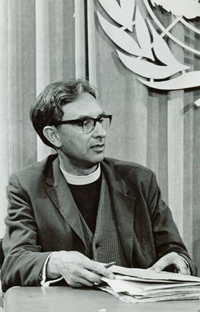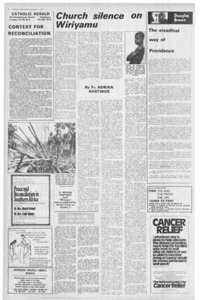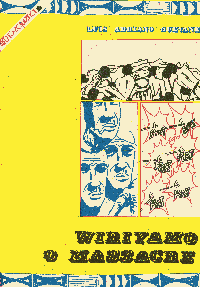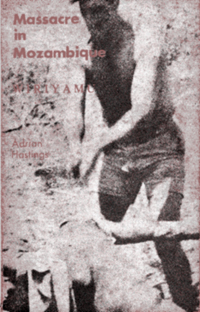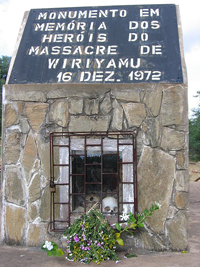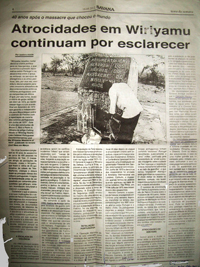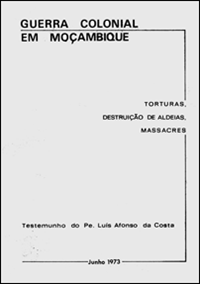Atrocities and Massacres, 1960-1977:
Wiriyamu, Mueda and Others
Dossier MZ-0354
![]()
Message from Prof. Mustafah Dhada
The following message from Prof. Mustafah Dhada is dated 20 September 2022, and is re-posted here with his permission. It's a response to Portugal's recent recognition of responsibility for the Wiriyamu massacre (see e.g. here, "Costa pede desculpa a Moçambique por massacre de Wiriyamu".) Dhada's writings on the Wiriyamu massacre (see below for press reports and other documents) are fundamental to an understanding of the nature of the so-called ‘colonial war’, which has now been recognised, if only partially and belatedly, by the Portuguese government. His activism on this issue in pursuit of the truth has been exemplary, at considerable cost to himself.
"For the last three decades I have devoted my professional life to investigating colonial mass violence in general and the Wiriyamu massacre in particular, which resulted in two monographs, both published by Bloomsbury Academic Press, one in 2017 and the other bang in the middle of the pandemic in 2020. The academic community judged the 2017 text worthy of the Martin A Klein award and the text was subsequently reviewed by an established Portuguese scholar in the journal of the American Historical Association (AHA), and similar well ranked journals.
The AHA’s 2017 Denver conference subsequently showcased the research undergirding the book with a panel discussion led by the then AHA President; as did Coimbra University’s Centre for Social Studies (CES). The Denver panel included Peter Pringle, the journalist who outed the story in 1973. The Coimbra session included the commander responsible for leading the massacre who was assured of his safety as an attendee at the CES session.
That same year, Tinta da China published the monograph in Portuguese and sent a copy, I am reliably informed, to the Office of the Prime Minister with a note urging him to read it. Several articles on the subject appeared intermittently thereafter, including my own, the last of which I penned in 2021 asking Portugal either to re-evaluate its continued denial of the massacre, or provide a culture of evidence to back its position of denial held since 1973.
Last week Portugal changed its position. During a state visit to Maputo, Senhor Costa, Portugal’s Prime Minister acknowledged the veracity of what we have known and proved all along and begged forgiveness for the “inexcusable” atrocities committed by the Portuguese colonial army in the Wiriyamu triangle. An array of responses then cascaded in the public square, from demands to court marshal the perpetrators, to truth and reconciliation commissions, to reparations. Last week I was asked to pen my opinion on the public apology and the political fallout, which I have.
Briefly I said in my opinion piece, preliminary research suggests Wiriyamu was not an exception. Before we entertain reparations for the perished in Wiriyamu, I said we ought to investigate if mass violence was the systematic norm in Portugal’s colonial war. Otherwise, we will be replacing one fifty-year old denial with a freshly minted one, that is, mass violence in Portugal’s last colonial war was a fiction. To this end I proposed either a grant funded “Portugal’s Killing Fields Project” led by a consortium of scholars or a Prime Ministerial Commission, call it the Costa Commission. The opinion piece I crafted provides additional details that may well merit careful review.
As historians we work our tails off to advance the literature in our respective fields by disseminating our work, by having our work reviewed, by seeking the research foundations of our results evaluated, and by attracting affirmative nods on the qualities of our findings. We seldom witness our work coax the institutional needle of imperial governance towards evidence-based soundly argued truths. The monograph on Wiriyamu appears to have done just that! We know Mr Costa received the book. We know from reports he read the text. We know that with the exception of three short texts that allegedly exist based on putative primary sources, the Portuguese archives on Wiriyamu are few and these rely exclusively on secondary materials already in the public domain.
What I do not have is a direct quote from Senhor Castro that he read the book, and the impact it had or may have had in propelling his public apology. I am however, chasing answers to both of these questions.
The Wiriyamu book is truly a testament to us as scholars in the academy. The narrative nearly failed to reach its destiny in print, grammatical and spelling errors notwithstanding. Had a colleague not brought to my attention a published article casting doubt on the massacre, had several scholars not intervened on my behalf with the editors of the journal, and had a member of the editorial advisory board of that journal not intervened in favour of my right to a rebuttal, the latter would have been scuttled by the guest editor responsible for publishing the article casting a shadow of doubt on the Wiriyamu massacre.
The lack of a response to my rebuttal focusing on the text I wrote and not me as the person behind the text proved the ultimate catalyst for me to jettison my manuscript and start all over again, which I did. I nearly didn’t make it! As I penned the last line of the text, “Truly with massacres like these, who needs a conscience?” I suffered a cardiac arrest, which sent me into the arms of Dr Elizabeth Kaback, whose family had survived the Holocaust. Her sentience of the work I was doing propelled her to stave off my extinction. “You are doing important work,” she said, “we owe truth-telling to history,” she added."
![]()
This page deals with gross human rights violations by the Portuguese armed forces during the struggle for national independence in Mozambique, and is organised into four sections: 1. The Wiriyamu Massacre and Marcelo Caetano’s Visit to London, 1972-1973; 2. Wiriyamu: Attempted Cover-ups; 3. The Massacre of Mueda, 16 June 1960; and 4. Other Massacres. This last section of the dossier presents evidence that Wiriyamu was not an isolated incident, with items on other atrocities at Inhaminga, Mukumbura and Chai. Click on the titles to jump directly to the relevant section.
News of the massacre of villagers by the Portuguese army at Wiriamu (or Wiriyamu) in Tete on 16 December 1972 played an important role in mobilising public opinion against Portugal in the later phase of the independence struggle. The story originally broke in the Times of London on 10 July 1973, just before Marcelo Caetano’s planned visit to London the same month, and provoked intense correspondence and follow-up reports in that newspaper (see list below; not all reports are available from this page at this time). Adrian Hastings, the missionary who broke the story to the English-speaking world, subsequently published a book, Wiriyamu: My Lai in Mozambique (New York: Orbis, 1974); also published in Africa as Wiriyamu: massacre in Mozambique (Nairobi: Transafrican Publishers, 1974). The book includes two pages (click here) listing the most important contemporary newspaper reports about Wiriyamu.
There are also sources of information on Wiryamu and other massacres available on the Web. These include a detailed 2008 post by Abel Marques de Vasconcelos Cardoso on the massacres of Wiriyamu, Chawola and Juwau, with videos and photographs (click here); and a 2010 post on the Delagoa Bay Blog entitled «Wiriyamu e as entrevistas de Rodrigues dos Santos», with commentaries by Yussuf Adam and others (click here). The veterans’ website «Dos Combatentes da Guerra do Ultramar» includes a page on the massacre, with videos and press clippings, posted by Ilídio Costa, a former member of the Companhia de Caçadores de Mocimboa da Praia (click here).
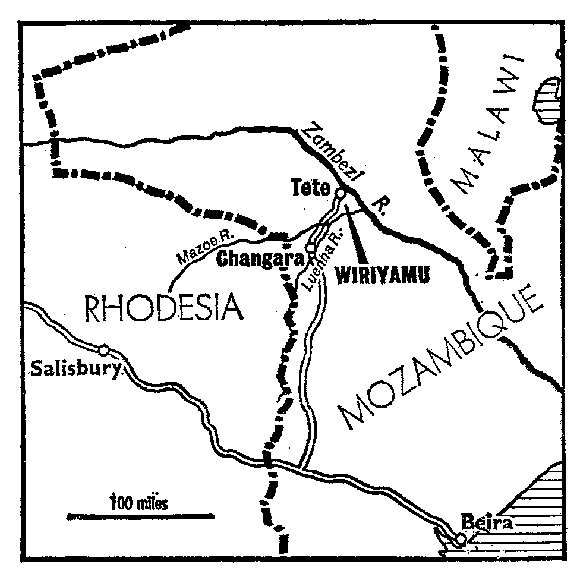
In November 1974, the United Nations General Assembly passed Resolution 3114, setting up a Commission of Inquiry on the Wiriyamu and related atrocities. The five-nation Commission, chaired by the representative of Nepal and with members from the GDR, Honduras, Madagascar and Norway, reported a year later, after hearing testimony in London and Dar es Salaam, and concluding that the massacres had indeed occured.
Some scholarly attention has been paid in recent years to the massacre of Wiriyamu. See Mustafah Dhada, «Contesting terrains over a massacre: the case of Wiriyamu» in: Contested terrains and constructed categories: contemporary Africa in focus, ed. George Clement Bond and Nigel C. Gibson (Boulder, Colo.: Westview, 2002), pages 259-276. A version of this text is available on Professor Dhada’s Academia.edu page, here.
More recently, an article in English by two Portuguese scholars promises to provoke controversy: see Bruno C. Reis and Pedro A. Oliveira, «Cutting heads or winning hearts: late colonial Portuguese counter-insurgency and the Wiriyamu massacre of 1972» Civil Wars vol.14 no.1 (March 2012), pages 80-103 (click here [requires subscription]). A summary of the article by Isadora Ataíde was published in Portuguese in the Maputo weekly Savana on 18 May 2012 under the title «40 anos após o massacre que chocou o mundo, atrocidades em Wiriyamu continuam por esclarecer». This received a short rebuttal by the Swiss scholar Eric Morier-Genoud, «Wiriyamu: atrocidade por esclarecer?» on page 11 of the 1 June edition of the same newspaper [click here to read this piece].
The massacre of Mueda in Cabo Delgado on 16 June 1960 was and remains a fundamental legitimising event for the Mozambican independence struggle (for a deconstruction, see Michel Cahen, ‘The Mueda case and Maconde political ethnicity: some notes on a work in progress,’ Africana Studia, no.2, 1999, pages 29-46 [available on the CEAUP website]). See also the post dated 16 June 2011 on Moçambique para Todos, here. This dossier includes a rare contemporary Lisbon newspaper account dated 19 June 1960, three days after the event (see below).
1. The Wiriyamu Massacre and Marcelo
Caetano’s Visit to London, 1972-1973
◊ 10 July 1973
Adrian Hastings. Portuguese massacre reported by priests. The Times, 10 July 1973. Click here to download a PDF file, size 299 kb. The story breaks for the English-speaking world.
◊ 10 July 1973
The massacre in Mozambique [editorial]. The Times, 10 July 1973. Click here to download a PDF file, size 106 kb. The ‘Thunderer’ comments on the story that it is running, refering to feelings of ‘shock and horror’ and stating that there is ‘little doubt of the substantial accuracy of the report’ by Adrian Hastings.
◊ 11 July 1973
No enquiry, no welcome. The Times, 11 July 1973. Click here to download a PDF file, size 133 kb.
◊ 11 July 1973
Mr. Wilson demands cancellation of visit by Portuguese leader. The Times, 11 July 1973. Click here to download a PDF file, size xx kb.
◊ 11 July 1973
Mr. Heath will not call off Portuguese state visit: massacre denied by Lisbon. The Times, 11 July 1973. Click here to download a PDF file, size 54 kb.
◊ 11 July 1973
Lord Gifford and others. Reported massacre in Mozambique. The Times, 11 July 1973. Click here to download a PDF file, size 91 kb.
◊ 11 July 1973
David Leigh. Priest derides official denial. The Times, 11 July 1973. Click here to download a PDF file, size 79 kb.
◊ 11 July 1973
A. M. Rendel. Embassy issues angry reply. The Times, 11 July 1973. Click here to download a PDF file, size 70 kb.
◊ 12 July 1973
M. A. Faul. Reported massacre in Mozambique and Portuguese policy. The Times, 12 July 1973. Click here to download a PDF file, size xx kb.
◊ 12 July 1973
Priests comment on slaying report. New York Times, 12 July 1973, page 5. Available in New York Times archive (requires subscription). Three Spanish Roman Catholic missionaries said today that two fellow priests had personally met survivors of a massacre of at least 400 men, women and children by Portuguese troops in a Mozambique village.
◊ 13 July 1973
Secretary-General of the International Commission of Jurists. Reports of atrocities by Portuguese troops in Mozambique. The Times, 13 July 1973. Clipping not available on MHN.
◊ 14 July 1973
Paul Hofmann. New charges of mass executions in Mozambique are made in Rome. New York Times, 14 July 1973, page 9. Available in New York Times archive (requires subscription).
◊ 14 July 1973
All the Africans in Tete know where massacre took place, ousted missionary says in Madrid. The Times, 14 July 1973. Clipping not available on MHN.
◊ 15 July 1973
Massacre reports from Africa grow. New York Times, 15 July 1973. Available in New York Times archive (requires subscription).
◊ 16 July 1973
Pope pleads for the oppressed. The Times, 16 July 1973. Click here to download a PDF file, size 20 kb. The Pope refers to ‘inhuman delinquency’, taken to refer to the Wiryamu massacre. A question is put down in the Italian parliament calling for condemnation of Portuguese atrocities.
◊ 16 July 1973
Harry Debelius. Wiriyamu ‘is marked on Tete mission maps’. The Times, 16 July 1973. Click here to download a PDF file, size 184 kb. In a report datelined Madrid, a Spanish missionary confirms and locates the village of Wiriyamu in response to Portuguese denials of its existence. The Times publishes a sketch map showing the village [reproduced above].
◊ 16 July 1973
George Clark. Labour demand for inquiry at massacre scene. The Times, 16 July 1973. Click here to download a PDF file, size 88 kb. Harold Wilson and Michael Foot are to demand in Parliament that the Portuguese government permit an international inquiry to visit the village of Wiriyamu. Labour will also push for the suspension of Portuguese membership of NATO. Labour and Liberal politicians are also to boycott functions linked to the visit by Dr. Caetano.
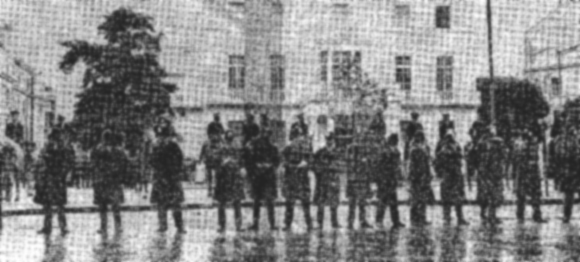
Above: the police cordon protecting the Portuguese embassy as thousands protest the Caetano visit. MHN apologises for the poor quality of this picture (credit: Bill Warhurst).
◊ 16 July 1973
Christopher Walker and David Leigh. Heavy police precautions as Dr Caetano begins his visit to Britain today: 5,000 in London protest march. The Times, 16 July 1973. Click here to download a PDF file, size 189 kb. Lead story, with a picture of a 100-metre police cordon protecting the Portuguese Embassy in London (reproduced immediately above). Over 100 police, including armed members of the Special Branch, have been assigned to protect Caetano. The article details Caetano's programme and planned protests aimed at disrupting it.
◊ 16 July 1973
Adrian Hastings and others. Reported massacre in Mozambique: how it was made known. The Times, 16 July 1973. Click here to download a PDF file, size 281 kb. Letters to the editor from Adrian Hastings, David Crouch, G. Lewis, J. P. Miller, and M. Rashleigh Toone, this last a correction to a previous letter, published on 13 July 1973.
◊ 16 July 1973
Sweden to double its aid to FRELIMO. The Times, 16 July 1973. Click here to download a PDF file, size 229 kb. The Swedish government will push for a UN investigation into the alleged atrocities in Mozambique, and will double aid to liberation movements in Portuguese African colonies. Swedish trade unions are also planning measures against Portugal.
◊ 16 July 1973
Jerome Caminada. A sea of turbulence awaits Dr Caetano during London visit. The Times, 16 July 1973. Click here to download a PDF file, size 131 kb. Opinion piece broadly sympathetic to Caetano and the ‘graceful figure’ of his daughter, Ana Maria Caetano. Caminada refers, inter alia, to the ‘strength of Chinese interference from Tanzania’.
◊ 17 July 1973
Press Council is asked to investigate. The Times, 17 July 1973. Click here to download a PDF file, size 49 kb. John Jackson, a Conservative Party prospective candidate, asks the Press Council to investigate whether the Times took the necessary steps to check its information before publishing the original Wiriyamu report.
◊ 17 July 1973
José Shercliff. 40,000 people demonstrate in Mozambique capital. The Times, 17 July 1973. Click here to download a PDF file, size 61 kb. Large demonstration takes place in Lourenço Marques, repudiating reports in the Times concerning the Wiriyamu massacre. Both blacks and whites are in the crowd, which is addressed by the mayor, Emílio Martins, and the governor-general, Pimentel dos Santos.
◊ 17 July 1973
Dr Caetano and Mr Heath meet angry demonstrations at Greenwich after peaceful day. The Times, 17 July 1973. Click here to download a PDF file, size 175 kb. Lord Gifford of MAGIC attributes the absence of anti-Portuguese protest during Caetano’s visit to the ‘secrecy’ with which it was organised. Rest of the story describes Caetano’s conversations with Heath, and a dinner at the Royal Naval College in Greenwich.
◊ 17 July 1973
Churchmen call for impartial inquiry. The Times, 17 July 1973. Click here to download a PDF file, size 80 kb. The steering committee of the Commission for International Justice and Peace has asked for an immediate impartial inquiry into the Wiriyamu massacre.
◊ 17 July 1973
Catholics in Holland urge Papal statement. The Times, 17 July 1973. Click here to download a PDF file, size 62 kb. Prominent Dutch Catholics have signed a letter asking why the Vatican has maintained silence on the Wiriyamu events, and request that the Pope issue a statement. Meanwhile the World Council of Churches (WCC) in Geneva, has come out in support of Swedish demands for a UN investigation.
◊ 17 July 1973
Bishop of Tete says his duty is not to become involved in controversy. The Times, 17 July 1973. Click here to download a PDF file, size 98 kb. Augusto César, Bishop of Tete, refuses to comment on the massacre allegations, saying his duty is to his flock. Meanwhile in Milan, the Italian newspaper Corriere della Sera publishes reports on 16 or 17 July regarding massacres by Portuguese troops in Guinea-Bissau between January and May 1973. In Rome, the periodical Il Mondo is preparing to publish further reports from Father Luís Alonso da Costa on Mozambican atrocities.
◊ 17 July 1973
David Leigh and Christopher Walker. Distribution of pro-Lisbon leaflets was arranged by Zanzibari. The Times, 17 July 1973. Click here to download a PDF file, size 166 kb. Ahmed Seif Kharusi, chair of the Zanzibar Association, paid for pro-Portuguese leaflets to be handed out at a protest rally in London, for motives which were unclear, and with funding which he refused to disclose.
◊ 17 July 1973
Basil Davidson and others. Mozambique atrocity reports: Portuguese policy in the colonies. The Times, 17 July 1973. Click here to download a PDF file, size 378 kb. Letters to the editor from Basil Davidson, David Vicars, John Crawley, Philip Noel-Baker, Denise E. Lester, William Burridge, and A. J. C. Kerr.
◊ 18 July 1973
Visa refused for The Times. The Times, 18 July 1973. Click here to download a PDF file, size 282 kb. Michael Knipe, a Times journalist covering southern Africa, is refused a visa for Mozambique because of ‘fears for his safety’ at the hands of outraged Mozambicans.
◊ 18 July 1973
Paul Oestreicher and others. Mozambique. The Times, 18 July 1973. Click here to download a PDF file, size 121 kb. Letters to the editor from Paul Oestreicher, David Tereshchuk, Hannah Stanton, and D. Keating.
◊ 18 July 1973
On all grounds Portugal must remain a member of NATO. The Times, 18 July 1973. Click here to download a PDF file, size 286 kb. Report of a parliamentary debate on Portugal.
◊ 18 July 1973
Nine arrested during protest outside Buckingham Palace. The Times, 18 July 1973. Click here to download a PDF file, size 346 kb. Protests against Caetano’s visit to London. The arrestees include Tariq Ali, who is pictured being taken away by policemen.
◊ 18 July 1973
Hugh Noyes. Past quotations used against Labour leader. The Times, 18 July 1973. Click here to download a PDF file, size 221 kb. Account of the House of Commons debate on Portugal and its colonies, claims that Wilson comes off worse in exchanges with Conservative leaders.
◊ 18 July 1973
Christopher Walker. More people join in protests over Caetano visit. The Times, 18 July 1973. Click here to download a PDF file, size 121 kb. Report on protests outside the Savoy Hotel in London against the visit by Dr Caetano. Amnesty International has asked permission to visit two priests detained in Machava Prison in Mozambique after reports of the Wiriyamu Massacre were published outside Portugal. Progressive conservatives in the UK have condemned the Caetano visit to London.
◊ 18 July 1973
Cancellation of Dr. Caetano’s visit on the basis of article in The Times would be to prejudge case against an old and loyal ally – Foreign Secretary. The Times, 18 July 1973. Click here to download a PDF file, size 616 kb. Report of a British parliamentary debate on the visit of Dr Caetano.
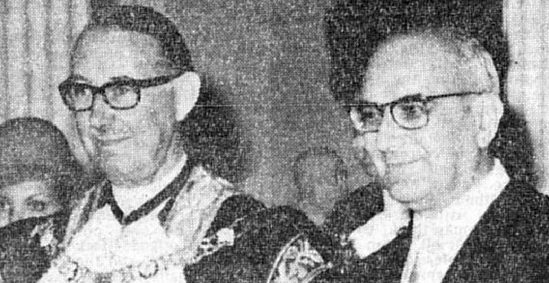
Above: The Portuguese prime minister Marcelo José das Neves Alves Caetano (1906-1980), and Alan Raymond Mais, Baron Mais (1911-1993), Lord Mayor of London in 1972-1973, pictured together during Caetano’s ill-fated visit to the United Kingdom.
◊ 18 July 1973
A. M. Rendel. Lord Mayor offers an apology to Portuguese leader and criticizes newspaper report. The Times, 18 July 1973. Click here to download a PDF file, size 121 kb. Lord Mais, the Lord Mayor of London, apologises at a Mansion House dinner to Caetano for the hostile demonstrations against his visit, and criticises the Times for having published the allegations about the Wiriyamu massacre, hinting at an ulterior motive regarding the timing. See picture above.
◊ 18 July 1973
A. M. Rendel. Dr. Caetano rules out UN inquiry into massacre allegations. The Times, 18 July 1973. Click here to download a PDF file, size 145 kb. Caetano and Foreign Minister Rui Patrício meet with UK ministers and hold a press conference in the afternoon. They categorically deny that the Wiriyamu massacre ever took place or that irregular warfare is permitted in Mozambique, and rule out any sort of UN inquiry (Patrício acts as Caetano’s interpreter into English). Seventy percent of Portuguese troops in Mozambique were Africans.
◊ 18 July 1973
Yelling and jeers as MPs debate London visit of Dr. Caetano. The Times, 18 July 1973. Click here to download a PDF file, size 32 kb. Alec Douglas-Home accuses Harold Wilson of double standards in a noisy debate on the Caetano visit in the British parliament.
Above: an extract from the Portuguese television programme Grande Reportagem with clips of Caetano and Adrian Hastings commenting on the question of Wiriyamu. Caetano claims there is an international campaign against Portugal; Hasting describes himself as politically naive.
◊ 18 July 1973
Worse than the Nazis, missionary says. The Times, 18 July 1973. Click here to download a PDF file, size 179 kb. In a report datelined Rome from the weekly Il Mondo, expelled missionary Luís Afonso da Costa is quoted as saying he witnessed torture, decapitations and the cutting open of pregnant women by Portuguese soldiers, who are worse than the Nazis.
◊ 18 July 1973
Harry Debelius. Priest says he spoke to survivors. The Times, 18 July 1973. Click here to download a PDF file, size 127 kb. Vicente Berenguer Llopis, a Spanish missionary, names the nun who witnessed the aftermath of the Wiriyamu massacre, which he says took place on Saturday 16 December 1972.
◊ 18 July 1973
David Leigh. War against Frelimo like fight with IRA. The Times, 18 July 1973. Click here to download a PDF file, size 56 kb. In a BBC interview, Caetano compares the Portuguese war against Frelimo with the British campaign against the IRA. Also a report datelined New York that Kurt Waldheim, UN secretary-general, is to meet Adrian Hastings.
◊ 19 July 1973
Le Monde says Africans’ silence is surprising. The Times, 19 July 1973. Click here to download a PDF file, size 35 kb. Le Monde comments on the silence among African political leaders about the atrocities. The Times points out that Le Monde is alone among French papers in paying more attention to the atrocities than to the Caetano visit.
◊ 19 July 1973
Christopher Walker. 300 police ring Caetano’s reception. The Times, 19 July 1973. Click here to download a PDF file, size 111 kb. Dinner held at the Portuguese Embassy on a rainy evening and attended by Edward Heath is protected by three hundred police. Earlier over 1,000 protesters had greeted Caetano when he visited an exhibition at the British Museum. There have been 17 arrests in the three days of the visit, including Tariq Ali, who was charged with assault.
◊ 19 July 1973
B. D. Ross and others. Attitude to race in Mozambique. The Times, 19 July 1973. Click here to download a PDF file, size 148 kb. Letters to the editor from B. D. Ross, John Paul (former missionary in Niassa province), Manuel Azevedo, Peter Elstob and Kenneth Clarke.
◊ 19 July 1973
A. M. Rendel. Whitehall plays it by ear in Africa. The Times, 19 July 1973. Click here to download a PDF file, size 127 kb. Apparent inconsistencies in British policy towards Africa mask a desire to protect British interests while working for change, argues Rendel, the Times’ diplomatic correspondent, in a general article starting from Caetano’s controversial visit to London after the breaking of the Wiriyamu massacre story.
◊ 20 July 1973
Withdrawal of the White Fathers from Mozambique. The Times, 20 July 1973. Click here to download a PDF file, size 212 kb.
◊ 20 July 1973
João de Sá. Para o rev. Adrian Hastings mandar publicar no «Times»: É assim o ‘racismo’ português. Unidade, 20 July 1973. First published in Diário de Luanda, date unknown. Click here to download a PDF file, size 142 kb.
◊ 20 July 1973
Augusto César. Wiriyamu: um samba de malucos num labirinto de espelhos. Unidade, vol.1, no.8, 20 July 1973. Click here to download a PDF file, size 708 kb.
◊ 20 July 1973
Portuguese converge on Lisbon to welcome Dr. Caetano back home. The Times, 20 July 1973. Click here to download a PDF file, size 153 kb. Large and supportive demonstration greets Caetano on his return to Lisbon. Includes report from Christopher Walker that security costs for the visit were in the range £80,000-£150,000, and quoting Polly Gaster of MAGIC to the effect that the anti-Caetano demonstrations had been successful.
◊ 21 July 1973
David Wigg. Priest gives massacre details to UN committee. The Times, 21 July 1973. Click here to download a PDF file, size 235 kb. Adrian Hastings gives evidence on the Wiriyamu massacre to the UN Decolonisation Committee, chaired by Salim Salim. Before giving evidence, he met briefly with Kurt Waldheim. With photograph.
◊ 21 July 1973
Michael Knipe. African civilians suffering heavily in Mozambique war. The Times, 21 July 1973. Click here to download a PDF file, size 151 kb.
◊ 22 July 1973
Peter Hogg and others. Mozambique. The Times, 22 July 1973. Click here to download a PDF file, size 129 kb.
◊ 23 July 1973
Michael Knipe. Mozambique bishop maintains his silence on reports of massacres. The Times, 23 July 1973. Click here to download a PDF file, size 136 kb. Report datelined Tete city, 22 July. Knipe has interviewed the Bishop of Tete, César Augusto Ferreira da Silva, who was unforthcoming, and spent some time with other journalists, accompanied by Portuguese troops, trying to locate Wiriyamu village. Poor quality image.
◊ 24 July 1973
George F. Kennan and others. Double standards over Mozambique. The Times, 24 July 1973. Click here to download a PDF file, size 127 kb.
◊ 24 July 1973
Michael Knipe. Reporter of The Times ordered out of Tete. The Times, 24 July 1973. Click here to download a PDF file, size 125 kb.
◊ 25 July 1973
Michael Knipe. Mozambique secret police keep an eye on correspondent from the Times. The Times, 25 July 1973. Click here to download a PDF file, size 83 kb.
◊ 26 July 1973
Peter Niesewand. Labour turning against Portugal. The Guardian, 26 July 1973, page 4. Click here to download a PDF file, size 109 kb.
◊ 27 July 1973
O sentido. Unidade, 27 July 1973, page 4. Click here to download a PDF file, size 98 kb. Says that the Wiriyamu case is nothing more than a cowardly attack on the morale of the Portuguese army, by an enemy who has realised that military victory is impossible.
◊ 29 July 1973
Peter Pringle. Secret police seize my Mozambique tapes. Guardian [?], 29 July 1973 [?]. Click here to download a PDF file, size 117 kb. Pringle reports that the DGS (ex-PIDE) has expelled him from Tete province and confiscated his notebooks, tape recordings, films, diary and other documents, after three days there. Click here to download a PDF file, size 117 kb.
◊ 30 July 1973
Michael Knipe. Portuguese army chief defends policy in Mozambique. The Times, 30 July 1973. Click here to download a PDF file, size 242 kb.
◊ August 1973
American Committee on Africa with Adrian Hastings. Portugal’s Rule by Violence Exposed: Massacre in Mozambique. New York: ACOA Fact Sheet, August 1973. 12 pages. Digitised by Aluka, and available as a PDF file, size 652 kb. from the African Activist website, here. «This document is based on a report by Father Adrian Hastings on the massacre of more than 400 African villagers in Wiriyamu, Mozambique. It includes a press statement by FRELIMO about the massacre in Tete Province and newspaper articles ‘Portugal Admits Abuse’ and ‘Portuguese massacre reported by priests’ by Adrian Hastings».
◊ 6 August 1973
Aquino de Bragança. Les enfants fusillés avec leur mére. Afrique-Asie, no.36, 6 August 1973, pages 22-24. Click here to download a PDF file, size 390 kb.
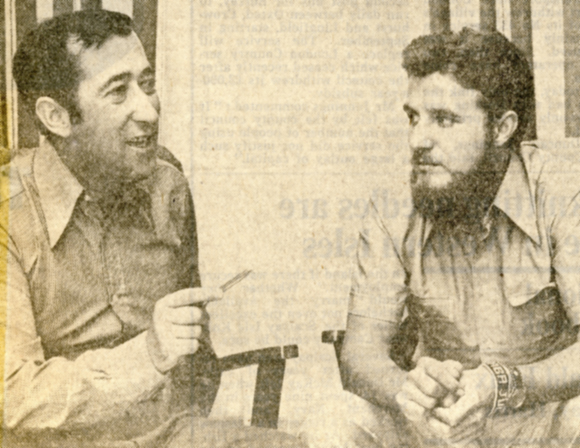
Above: the two Burgos Fathers, Vicente Berenguer Llopis (left) and Júlio Moure (right), pictured on 5 August 1973 during a visit to London. They were among the authors of the Spanish report on massacres in Mozambique.
◊ 6 August 1973
Richard Wigg. Missionary names five survivors who saw Mozambique massacre. The Times, 6 August 1973. Click here to download a PDF file, size 438 kb. An interview with Father Vicente Berenguer Llopis and Father Júlio Moure of the Burgos Fathers.
◊ 17 August 1973
Klaus Pokatzky. After a massacre report: an information gap was filled. Frankfurter Rundschau, 17 August 1973. Click here to download a PDF file, size 93 kb. [Not original clipping; translation into English by Facts and Reports].
◊ 23 August 1973
Communist newspaper claims further atrocities. AFP, 23 August 1973 [from Facts and Reports]. Click here to download a PDF file, size 176 kb. Agence France Presse says that the Italian Communist newspaper Unità reported on 22 August 1973, citing eye-witness testimony, that South African and Rhodesian troops have also been involved in atrocities in Mozambique.
◊ 23 August 1973
Douglas Alexander. Priests to face charges of helping Frelimo. The Age [Melbourne], 23 August 1973. Click here to read a PDF of this story at Google News. Two Burgos Fathers, of Spanish nationality, from the Mukumbura Mission in Tete have been arrested by the Mozambican colonial authorities.
◊ 26 August 1973
The ugly face of Portugal. Observer, 26 August 1973. Click here to download a PDF file, size 287 kb.
◊ 16 September 1973
Canon Carr’s criticisms. AFP, 16 September 1973 [from Facts and Reports]. Click here to download a PDF file, size 55 kb.
◊ 25 September 1973
[Extract from interview with Adrian Hastings]. Africa, 25 September 1973. Click here to download a PDF file, size 95 kb.
◊ 8 October 1973
Frelimo report issued on massacre by Portuguese. The Times, 8 October 1973. Click here to download a PDF file, size 82 kb.
◊ 14 December 1973
UN to hold inquiry on Wiriyamu massacre. The Times, 14 December 1973. Click here to download a PDF file, size 26 kb.
◊ 30 April 1974
Eric Pace. UN will examine torture charges in Mozambique. New York Times, 30 April 1974, page 3. Available in New York Times archive (requires subscription).
◊ 28 June 1974
Kathleen Teltsch. UN panel backs Mozambique case: it says Portuguese troops killed unarmed people. New York Times, 28 June 1974, page 7. Available in New York Times archive (requires subscription).
◊ 22 November 1974
Report of the Commission of Inquiry on the Reported Massacres in Mozambique. New York: United Nations, 22 November 1974. iv, 40 pages. Click here to download a PDF file, size 3.0 Mb. The Commission, which worked without Portuguese government cooperation and did not visit Mozambique, concluded that it had no doubt that «during the period under study, personnel, for whose acts the Portuguese colonial Government is responsible, perpetrated a number of atrocities in Mozambique». The full transcripts of the evidence that the commission heard are available on-line via the UN documents database (here) under reference numbers A/AC.165/PV.1- et seq.
◊ 11 December 1974
UN unit confirms massacres and torture in Mozambique. International Herald Tribune, 11 December 1974. Click here to download a PDF file, size 45 kb.
◊ 19 December 1982
Wiriyamu: recordando os massacres coloniais. Domingo, 19 December 1982. Click here to download a PDF file, size 221 kb.
◊ 23 February 1984
Manuela Ferreira. Wiriamu: a aldeia da fome negra. O Globo, 23 February 1984. Click here to download a PDF file, size 288 kb. Ten years after the massacre, villagers are dying of hunger because of drought.
◊ 25 June 1999
Alfredo Macaringue. É o sobrevivente Vasco Tenente quem o diz, recordando Wiriamu: «Comam estas sardinhas para se despediram da vida» – disseram os soldados portugueses momentos antes do massacre que custou a vida a perto de duzentos pessoas. Notícias [suplemento], 25 June 1999, page 11. Click here to download a PDF file, size 381 kb.
2. Wiriyamu: Attempted Cover-Ups
◊ 17 December 1981
Jack Anderson. Richard Allen and ’73 massacre in Mozambique. Washington Post, 17 December 1981. Click here to download a PDF file, size 138 kb.
◊ 17 December 1981
Jack Anderson. Agent Allen: new shocker. New York Post, 17 December 1981. Click here to download a PDF file, size 279 kb.
◊ 29 June 1980
Sol Carvalho. Editor de um livro denunciando massacres em Moçambique vítima de processo judicial: José Ribeiro concede entrevista exclusiva à «Tempo». Tempo, no.507, 29 June 1980, pages 29-31. Click here to download a PDF file, size 621 kb.
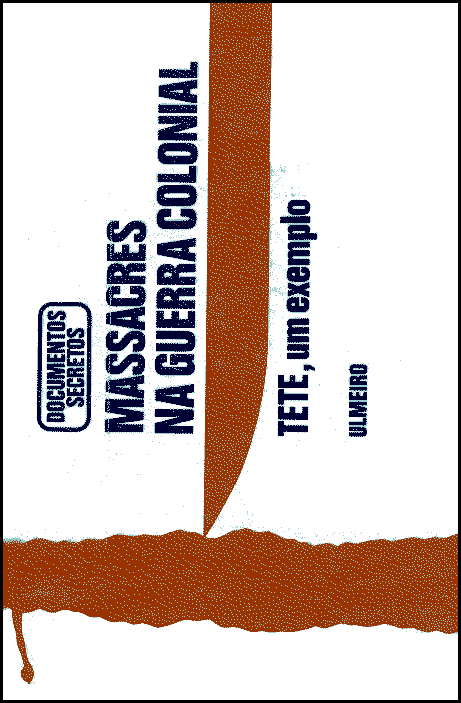
◊ 11 March 1983
Ulmeiro enfrenta justiça militar. O Jornal, 11 March 1983. Click here to download a PDF file, size 83 kb. The book that Ulmeiro was prosecuted for publishing was Massacres na guerra colonial.
3. The Massacre of Mueda, 16 June 1960
◊ 19 June 1960
Reunião de indígenas perturbada por agitadores estrangeiros que foram repelidos. O Século (Lisboa), 19 June 1960. Click here to download a PDF file, size 451 kb.
◊ April-June 1970
Alberto Joaquim Chipande. The massacre of Mueda. Mozambique Revolution, no.43, April-June 1970, pages 12-14. Click here to download a PDF file, size 833 kb.
◊ 13 June 1981
Mueda evocada em Portugal. Notícias, 13 June 1981. Click here to download a PDF file, size 32 kb.
◊ 13 June 1982
Mueda: memórias de um massacre. Tempo, no.609, 13 June 1982, pages 24-[?]. Click here to download a PDF file, size 791 kb.
◊ 19 June 1982
[No title]. Notícias 19 June 1982. Click here to download a PDF file, size 1.2 Mb. The report includes a reproduction of the report that Notícias carried on 18 June 1960 under the heading «Agitadores estrangeiros nos Macondes».
◊ October 1993
Yussuf Adam and Hilário Alumasse Dyuti [apresentação]. Entrevista: o massacre de Mueda – falam testemunhas. Arquivo [Maputo] no. 14 (October 1993), pages 117-128. Click here to download a PDF file, size 145 kb. Interviews with Daniel Muilundo; Cornélio João Mandanda; Rachid Katame; and Jacinto Omar.
4. Other Massacres
◊ July-September 1971
End of a mission: why the White Fathers left Mozambique. Mozambique Revolution [Dar es Salaam], no.48, July-September 1971, pages 19-22. Click here to download a PDF file, size 826 kb.
◊ January-March 1972
After the massacres of Mukumbura, a victim’s relatives join the struggle. Mozambique Revolution [Dar es Salaam], no.50, January-March 1972, pages 9-10. Click here to download a PDF file, size 690 kb.
◊ Summer 1974
J. Martens, A. Verdaasdonk, J. van Rijen, A. van Kampen and J. Tielemans. Diary of Inhaminga. Issue: A Journal of Opinion vol.4 no.2 (Summer, 1974), pages 62-73. Click here to access a copy through JSTOR (requires subscription).
◊ 7 November 1976
Página da história da resistência do povo moçambicano: os massacres de Inhaminga. Tempo, no.354, 7 November 1976, pages 34-40. Click here to download a PDF file, size 2.7 Mb.
◊ 25 September 1977
Chai: o massacre que os colonialistas esconderam. Tempo, no.364, 25 September 1977, pages 34-37. Click here to download a PDF file, size 1.7 Mb.
![]()



![Aluka: Struggles for Freedom [subscription required] Struggles for Freedom](imgs/aluka_200.png)



